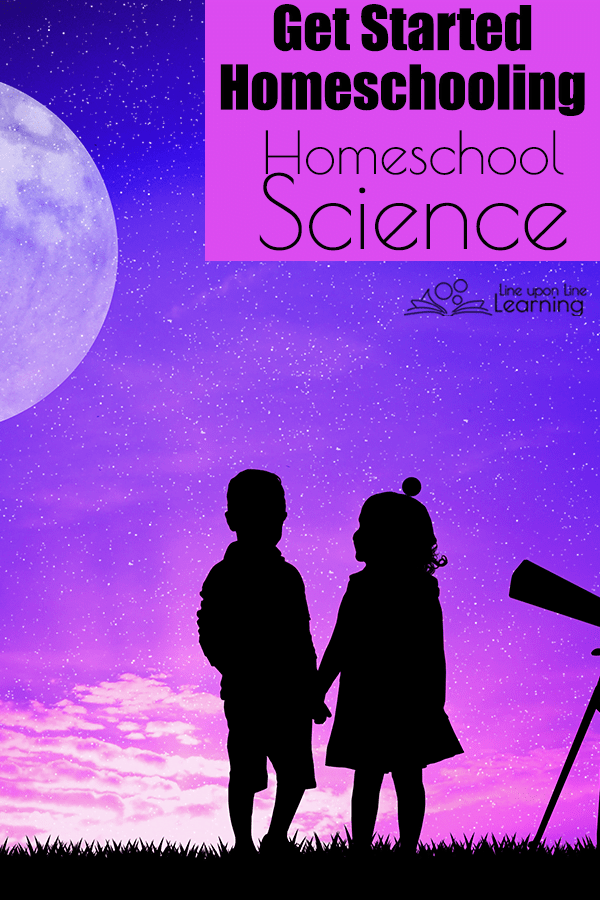Science is a subject that sometimes scares homeschool parents, but it does not have to! Especially for young children, teaching science is a natural part of discovering how the world works. On the other hand, a science curriculum can help parents direct a child’s interest and help them cover biology, geology, earth and space science, chemistry, physics, and more.
As with my other posts about homeschool curricula, I’m focusing on secular options. I have not used all of these, and so I link to those who have used them or reviewed them for your own convenience. I also share my own ideas for making science work in your homeschool.

For my very young children, I find that living life provides plenty of scientific experiments. We cook together, we build things out of blocks and watch them fall down or pretend Rapunzel is on a tower. We test what floats and sinks. We read great books that discuss science.
With my older children and at my co-op, I taught science through fun STEM projects. We built a bridge. We tested out paper airplanes. See my full list of fun STEM ideas for more of those types of ideas.
Going out into nature is also an essential part of life. For those who do not want to use a curriculum, observing the world around you can teach you about plants and animals, earth science, space (astronomy), and so much more. Physics is the study of natural laws. Why do we wear a seatbelt? A great part of being a homeschooling parent is saying “I don’t know! Let’s go find out!” when children have a question.
Other Posts about Science at Home
- R.E.A.L. Science Odyssey (elementary and middle/high school). The initials in the title stand for “read, explore, absorb, and learn,” and RSO does this with story-like text for the youngest learners and lots of hands-on experimentation.
- Real Science 4 Kids (K-4 and 5-8). With two different approaches to learning science available, RS4K allows parents to choose how to present information to their kids. One way is by focusing on the five science disciplines (Astronomy, Biology, Chemistry, Geology, and Physics) in the Focus On series, available for the two age levels. The other approach is by grade-level “Building Blocks” books from 1 to 8, which shares the same information with each subject covered in each year. A teacher manual, lab book, and student text make this an easy-to-access program.
- Nancy Larson Science (K-5). This is a complete science curriculum that is easy to teach. The teacher materials provide scripted conversations to help lessons run smoothly. Homeschool parents can purchase complete kits with all tools, hands-on activities, student materials, and teacher resources ready to go out of the box.
- Supercharged Science. With engaging videos of labs and experiments as well as detailed pages for the parents to print off to replicate labs, this is an amazing multi-age science curriculum website. With one subscription, children from K-8 can access hundreds of videos and lessons, and high school students can add on even more (advanced) lessons. Note: If you know you want this, you can get a discount via the Homeschool Buyer’s Co-op.
- Study.com (3-12). As with the mathematics curricula mentioned before, the science classes on this site are taught via video by trained experts in their fields.
- Discovery Education (K-12). The Science Techbook (K-8) site provides a complete online replacement to traditional science textbooks. homeschool access is available through the Homeschool Buyer’s Co-op. See more details also about the 9-12 Science Techbook.
- Inquiry in Action (elementary). This free set of resources and curricula are provided by the American Chemistry Society to teach about physics and chemistry.
- Khan Academy (high school). Khan Academy provides video lectures and online quizzes in many science subjects (include AP subjects), free of charge.
Check out the Homeschool Buyer’s Co-op to get discounts on subscriptions for some of these science programs, as well as

More in This Series
Homeschooling can feel overwhelming, but take things one step at a time. Don’t try to do it all, and remember that a lot of life is learning about science. Ease into it and begin by deciding what you want to cover when you feel more comfortable with it.
- Get Started Homeschooling: Keep it Legal
- Get Started Homeschooling: Plan Your Homeschool Year
- Get Started Homeschooling: Schedule Your Day
- Get Started Homeschooling: All-in-One Curriculum Options
- Get Started Homeschooling: Teach Language Arts
- Get Started Homeschooling: Teach Math
- Get Started Homeschooling: Science in Your Homeschool
- Get Started Homeschooling: Teach Social Studies in Your Homeschool
- Get Started Homeschooling: Add in Arts and Music
- Get Started Homeschooling: Teach Physical Development and Health
- Get Started Homeschooling: Including Foreign Languages and Life Skills in Your Homeschool
Have another “how to homeschool” question? Contact me and I’ll write about it too. Send me an email if you have specific questions, or ask me directly on my Facebook page.

